
Pages in this Folder:

Related Folders:
See also Department Site Map
This website was developed in 2001 thanks to a grant from the Toronto Parks and Trees Foundation.
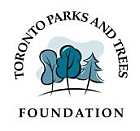
Notice: This web site is an information post and a forum for the community that uses the park, and to some degree for the surrounding neighbourhood. The editor of the web site reserves the right to post parts or all of any letters sent to the web site. If you do not want your letter posted, please let us know when you e-mail us, and we won't post it.
Comments?
For the basics, see
- Website & Privacy Policies
- How To Get Involved
- The Role of the Park
Search options:
Department Site Map
Custodians:
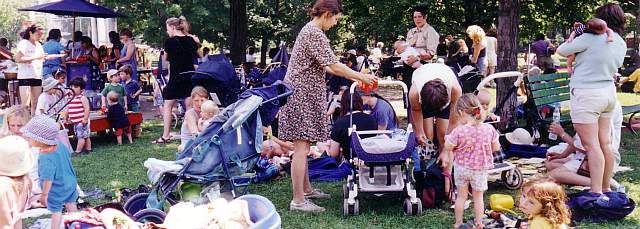
Editorials -- Breastfeeding and Human Rights:
- Breastfeeding Etiquette in the Shared-Use Rink House January 15, 2005
- Breastfeeding at the rink January 31, 2005
- The Breastfeeding Conflict as our Community Property February 7, 2005
- Breastfeeding and the Human Rights Laws: News From Our Legal Committee, March 3, 2005
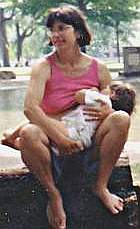
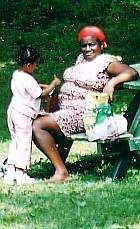
posted January 15, 2004
Breastfeeding Etiquette in the Shared-Use Rink House
When Dufferin Rink was rebuilt eleven years ago, it seemed like a good idea to widen its use so that families as well as youth would like to go there. Rinks have a tendency to become a bit unpleasant, with some scary scenes being played out - bullying and various illegal transactions. Dufferin Rink used to be well known as a place like that. If the rink could be made a more pleasant place, we thought, families would return and there would be a mix of rink uses that would be better for everyone - youth too.
So we added the wood stove and the cookies and the storybooks, and gradually families returned. We got female as well as male rink staff, worked with the city to improve the ice cleaning, posted "no swearing" rules on the wall, and more families came. (More youth too, the ones who had been bullied away before.) There used to be trouble with fights and damage on Friday nights, so Dan DeMatteis and Lea Ambros started Friday Night Supper, and the eaters squeezed out the rascals. Then the market came, and now there are days when it's hard to find anyplace to change into skates, the place is so full of activity.
<div class="sidebar-right-medium"> <p class="compact">See also <i>Email Correspondence with Dr. Paul Rapoport of the Topfree Equal Rights Association</i> lower on this page.</p> </div>
The youth whose turf was altered in this way have been pretty accepting of the changes, even if they have to go outside or into the washroom to change on busy days.
However it's important to make sure that a balance is maintained between being a shinny hockey change house and a place for families with little children. One issue that recently tested this principle came up over the breastfeeding of babies in the rink house.
Here's our practice: breastfeeding a baby is welcome anywhere in the rink house at any time. Babies have to eat, and that's the best way to nourish them (so that they will become strong skaters and hockey players!). No need to hide the nursing baby by putting a blanket over its head while it nurses, either - why hide such a wonderful sight?
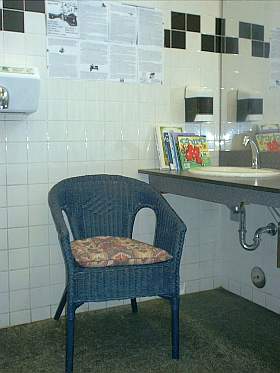
Wicker chair in washroom
There is however a problem if a mother feels the need to disrobe in such a way that a good deal more than the nursing baby is visible. A few babies are a bit rowdy, and hard to nurse discreetly. In those cases, we have several options. There is a comfortable seat in the women's washroom (the washroom is bigger and brighter than normal, so there's room for a nursing corner). If the baby's mother wants to stay in the main room, there is a curtain that can be pulled across half the room, or if she prefers, there is a small screen that can be placed beside her, wherever she's sitting, to give a bit more privacy.
The reason why any radical disrobing during breastfeeding is screened like this is that many people find it unsettling to see a woman who is visibly undressed in the middle of the rink change room. Youth of both sexes are often modest, and so are many of the families of different cultures who have also come to use the rink house.
(By the way, a message to the occasional shinny hockey players who feel the need to strip down and change before or after they play hockey: the same thing applies to you folks - pull the curtain or change in the very large men's washroom, sitting on the bench that's provided there. Not everyone wants to see your underwear.)
Shared use of the rink house means taking into account all the different points of view, so all the different groups can come inside. Babies can eat, people can skate, farmers can bring their excellent food, young folks can play checkers with friends - the whole quilt.
posted January 31, 2004
Breastfeeding at the rink
Contrary to the impression that some readers of this newsletter may have got from NOW Magazine [ed. read the article] or the dufferingrovefriends list serve recently, breastfeeding is (and always has been) as welcome at Dufferin Rink as breathing, talking, or any other basic human activity. For the record: Dufferin Rink is probably the most family and baby-friendly rink in Toronto. Where there are lots of babies, there are lots of babies being breastfed. Mothers can, and do, nurse their babies on the rocking chair by the rink wood stove, at the checkers table while playing a game with another child, out at the side of the rink while watching their family skate, during the farmers' market - anywhere, anytime. It's the rare mother who chooses to cover herself with a blanket while she's breastfeeding at the rink - why should she? She and her baby are part of the colourful quilt of all that goes on in the rink clubhouse, all that makes it beautiful. Often there's so much else going on, nobody notices the babies being fed anyway. And if a baby is very fussy or the rink house is too crowded, and a mother wants to withdraw into a quieter, more private place, there's a comfortable wicker chair in the sink area of the women's washroom. That sink area is also, incidentally, the cleanest part of the rink house. (Our park budget doesn't include a CUPE Local 416 janitor-cleaner, despite the very large numbers of people who come to the rink house every week. So the clubhouse section gets rather dusty.)
Once in a while, a breastfeeding mother exposes more of herself than usual, perhaps forgetting that she's not in her living room, but rather in a mixed-age/ mixed-gender/ mixed-culture/ mixed-income rink house. Jutta Mason recently asked a mother to cover up more of her upper body, as she was preparing to breastfeed just after Friday Night Supper. The mother was very unhappy about the request. She reported Jutta to the city councillor and to the Friends of Dufferin Grove Park, saying that her "comments constitute gender harrassment and are a violation of the Ontario Human Rights Code." This action started an e-mail flurry on the park list serve, spreading out to NOW Magazine and then being passed to several breastfeeding list-serve forums elsewhere in North America. Our local elected representative, Councillor Adam Giambrone, worked with the City of Toronto Parks Department and a Saskatchewan advocacy group called Breastfeeding News to create a city breastfeeding policy. The policy is very cutting-edge. It exempts breastfeeding mothers from any clothing restrictions whatsoever, and broadens parts of Human Rights Commissions "guidelines" (not yet tested in the courts) to interpret even the drawing of a privacy curtain near an unclothed mother as an unlawful interference in the delicate process of feeding a baby.
Such a radical interpretation is impressive, but not practical in a rink house with such diverse users as ours. And although some of our recent e-critics are of the opinion that "those who feel uncomfortable are free to leave," we prefer to keep all the rink users with us, mixed as before. If necessary, the clubhouse can revert to its separate male side/female side change areas. That's how it used to be, until about eight years ago (a group of us committed an act of "community vandalism" and demolished the inside wall that separated the two areas). There has been lots of wonderful fun in that joined-up clubhouse since then, but the curtain to separate the areas is still there for tournaments, and therefore it's easy to re-establish separate change areas.
That may not be necessary though. In the eight years since the wall went down, we never had a demand for a policy statement, nor a human rights complaint, nor even much evidence of careless undressing by persons unmindful that they are in a community that reaches beyond their own kind. There was some recent e-discussion among a group wanting to come from other parts of the city and beyond to set up a "rowdy nurse-in" at our "infamous" rink. If that occurs, the separate change areas will be re-established. Until then, we'll keep the rink house joined up and friendly as before.
posted January 19, 2005
Email Correspondence with Dr. Paul Rapoport of the Topfree Equal Rights Association:
To: editor@dufferinpark.ca
As you are probably aware, many American states have recently passed pro- breastfeeding laws that do not tell a mother how she must perform that act. Some make it a crime to interfere with breastfeeding of any sort. Strictly, Ontario needs no such laws, because it is legal for a woman to be completely barebreasted nearly any time, including in the rink should she wish, for no evident purpose at all. I refer you to the appeal of Jacob v. R., decided in the appellant's favour on December 9, 1996 in the Ontario Court of Appeal.
Women in general are unlikely to be able to breastfeed in the best way possible, which is however they freely choose to do so, as long as others lay claim to controlling those breasts. In addition, North American cultures would lose their obsession with the sexuality of women's breasts if children could observe them being used for the life-giving purpose they are designed for.
Dr. Paul Rapoport
Topfree Equal Rights Association
www.tera.ca
Dear Dr.Rapoport,
Thank you for your counsel. Since you are part of the "topfree equal rights association" you will be aware that the Gwen Jacobs case specified that a woman could take her shirt off wherever a man could take his shirt off. Because our rink house is also a community clubhouse, men are not permitted to disrobe out in the open either, so we are breaking no law. You will be aware, also, that many commercial locations (e.g. restaurants, etc.) do not permit women to take their shirts off, nor are they required to permit this so as long as men are not permitted to take their shirts off.
Since I happily breastfed my three children everywhere and counselled many more breastfeeding mothers, I do agree with you that breastfeeding is the best way to go, and that the sight of a baby breastfeeding is entirely wholesome and to be celebrated. However, my considerations also include the wonderful multicultural, multi-ethnic world that makes up our neighbourhood. For that reason, it is the additional disrobing, beyond what is needed for the baby to be nourished, that needs some limitation at our rink house. Since our rink house/ clubhouse has become a well-loved destination for people of all ages and cultures, including far more nursing mothers than are present in any other rink house in the city, I think we can assume that our approach is a good one.
Jutta Mason, editor.
posted February 7, 2005
The Breastfeeding Conflict as our Community Property
Some years ago, a Norwegian criminologist named Nils Christie wrote a famous essay entitled "Conflicts as Property." In it he suggested that conflicts are a precious resource for a community so long as the people in the community get to argue, negotiate, get mad, get over it, try out solutions - together. Once a conflict gets packed off to the courts, Christie said, the community loses the benefit of it.
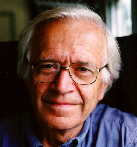
Nils Christie,
Professor of Criminology
This may seem like an upside-down way of looking at trouble - as a precious "property" belonging to ordinary people, that the courts must not steal from us. But when Jutta Mason first read Christie's essay, she got really interested. Soon after that, she got involved in the park, and during the thirteen years since then, his idea really helped sometimes. Working through the hard times can make the good times sweeter.
Conflicts are scary, of course, and the temptation to hide them or gloss over them or squash them is great. So on January 8, when <b>Erika Ross</b> sent her e-mail to the "Friends of Dufferin Grove Park" - saying an illegal act, a human rights violation, had been committed by Jutta speaking to her - some park friends said, don't say anything back, just apologize fast. Jutta said, "...but I disagree with what she is saying. I just asked her to pull her shirt down more while breastfeeding, to accommodate other people."
That's where the courts come in. The <b>Human Rights Commission</b>, some park friends said, operates on the basis of "guilty until proven innocent." In this case, the friends said, no matter who is troubled by it, you're not allowed to say anything at all about a breastfeeding woman's state of undress. If you do, there may be a lawsuit, there may be a fine. There can be years of complicated negotiations in the courts, starting with a tribunal, on to a civil court case and on from there, perhaps, to an appeal.
All that for speaking to a woman who was about to breastfeed her brand new little baby? Pick your battles, said some park friends, give in and just forget about it.
But not everyone said that. Others felt that if the human rights code truly means that even just saying something to a breastfeeding woman - something that she doesn't like - is an illegal act, then the fundamental freedom of speech comes into question. That's not a question that ought to be dropped easily.
A puzzle. City Councillor Adam Giambrone said it was a "no-brainer," he knew a breastfeeding right when he saw one. E-mails carried in messages from Missouri and Louisiana, Newfoundland, Rochester, and Scranton Pennsylvania, calling for retraction or punishment. NOW Magazine published a fairly balanced article, but atoned for it by printing critical reader mail for two weeks running - with a particularly shrill one from Massachusetts. Janice Reynolds, identified as the "Consumer Rep on the Breastfeeding Committee for Canada," weighed in from Saskatchewan, talking to a friend at Toronto Public Health "high up" who told her that the Medical Health Officer had asked to be briefed about the issue. (This "consumer rep" was tireless in her ideas, even suggesting - in an online forum called mothering.commune - a plan to entrap Jutta into a pattern of lawbreaking that would make litigation easier.) Joanne Gilmour, the Toronto Public Health spokesperson, declined to talk with us. Parks and Recreation Director Don Boyle declined as well, and in an e-mail he sent on February 1, tried to shut down more discussion. (He also enclosed some fact-sheets on the benefits of breastfeeding.)
Don's "I'm not going to talk to you about it" e-mail prompted us to finally send out a "help needed" message to friends of the park. And that's where Nils Christie, the criminologist, comes back in. On the weekend after the "help needed" message, the weather was exceptionally lovely, and the rink was full of skaters from Friday to Sunday. The talk about the issue of breastfeeding/ freedom of speech/ hurt feelings flowed on and on, inside the rink house, out on the ice, up along the snow hills, around the bake oven, back inside the rink house in front of the wood stove. The breastfeeding conflict -the energetic differences of outlook that Nils Christie said should be kept within the community - began to return to their rightful context.
- Many people expressed their incredulity about this friendly park being represented on the web, in the news, or down at City Hall as a battleground for breastfeeding rights.
- There was also a steady thread of worry about Erika Ross, and her vulnerability as the mother of a new baby and a two-year-old, caught in a situation she surely did not anticipate when she wrote her initial e-mail.
- Cynicism about the tunnel vision of new parents got some play among older or childless folks, and vexation about the giant strollers that block access in the rink house and the market. - At the same time, joy at the beauty and liveliness of the ubiquitous babies in what Herschel Streuman calls the "fertility crescent" in this neighborhood.
- Over and over (among all ages, with or without kids) there was the theme of the need for balance, common sense, willingness to accommodate other cultures and ages.
- A mother of twins told how tough it was to go places with baby twins, how you could try to be careful but you just would be uncovered sometimes. A mother with a new baby sat in the rink house with her friends and family, eating the park's beef casserole and breastfeeding at the same time, and joking about doing a typical-breastfeeding photo for the web site.
- There was consternation about the feeling of anger that had entered the dufferingrovefriends list serve so quickly as postings began to flood in, the nastiness, the futility of making arguments in that forum. The shiftiness of the web got lots of mention - people writing in with pseudonyms or several different "handles," often from unspecified locations. (New Zealand? Ossington?)
- And then there was the big question - if this park runs so much on good will that spreads out across differences, how do we return to that?
Back to Nils Christie again. It seems like everyone agrees on three things already - first thing, drop the e-mail arguments. This is not a virtual neighbourhood. The conflict was at Dufferin Grove Park, and that's where it will be worked out. Those folks who want to participate from outside the neighbourhood will have to come to the park in person. Second thing: the people at City Hall, who can (quite legitimately) make decisions affecting out park, need to engage directly with us about what should or could go on here. A letter-writing campaign has begun to encourage them to have a direct, open conversation (send e-mails to the general manager of Parks and Recreation, Brenda Librecz: BLibrecz@toronto.ca and Councillor Adam Giambrone: Councillor_Giambrone@toronto.ca. Third thing: stop talking about taking this conflict to court. It's unlikely to get far, but more importantly, it needs to be worked out here. The hope is that Erika Ross and her family will return to using the park with enjoyment, and will gradually, as the occasions arise, re-join the local conversation about how to accommodate differences. The shades of opinion in this conflict are as numerous as the flowers in spring, and if they're all given a legitimate place in the ongoing park conversations, maybe someday there will be a garden.
posted March 3, 2005
Breastfeeding and the Human Rights Laws: News From Our Legal Committee
On January 7, Jutta Mason made a comment to a breastfeeding woman at the rink house which led that person to make a now-well-known human rights complaint to the City. Jutta protested that it was the degree of undress she had spoken about, not the human right to breastfeed at the rink house (or anywhere else). Parks and Recreation Director Don Boyle wrote to us that any degree of undress while breastfeeding in the rink house is protected by law: "A woman has the right to be topless in public. We must recognize / respect these rights and move forward." City Councillor Adam Giambrone arranged for a formal apology from the City.
So a few of the park friends struck a legal committee to study the Ontario Human Rights Code [ed. see literature review] and the related Canadian legal cases [ed. see case law]. It was pretty evident that the "right to be topless" was not the issue at our rink. The Gwen Jacob case in 1996 had decided that anywhere a man could be shirtless, so could a woman. Neither of them would be subject to arrest for indecent exposure. But that doesn't abolish dress codes inside buildings - they just have to be equally applied. "No shirt, no shoes, no service" is not an illegal rule - if it covers both genders.
Since our park's rink is an unusual rink house/ community room combination, we don't let men go around shirtless any more than women. If shinny hockey players (male or female) want to change their clothes during public skating times, we ask them to move to the chairs in the sink area of the washrooms.
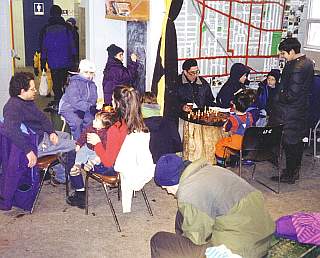
The Rink Clubhouse
But the human right to breastfeed comes under a different law - the right not to be discriminated against on the grounds of sex or family status. Neither a mother nor a baby can be discriminated against on the grounds of the baby's need to drink its mother's milk. Excellent! One of the many beauties of breastfeeding is that as long as the baby is with the mother, she can put the baby to the breast as soon as hunger strikes, and everyone is content. So wherever babies can be present (not usually in a concert hall or sitting in the middle of a road, but almost anywhere else), no one can tell the mother to stop feeding her baby.
Beyond that, the only direct reference in existing cases is a Manitoba Human Rights Tribunal decision from December 2000, in which the basic right of the mother to nourish her baby was annexed to a concern about "the duty to accommodate reasonableness and something of a give-and-take on the part of all those who are affected by a given situation."
So here's our legal study-group's idea. Let's try some good sense. Our park is already "breastfeeding central," and that's intentional. At the same time, we could take up the Manitoba human rights adjudicator's invitation to 'reasonableness.' Reasonably, a mother doesn't need to take off her shirt to breastfeed her baby even if the city policy says she can. Nor does she need to stand up in the middle of our crowded rink house and lift up her whole shirt before getting started. In the very rare case that a breastfeeding mother's personal style demands those things, someone can invite her to go and sit on the wicker chair in the sink area of the washroom. If she refuses, that may be her right. Others sitting nearby can tell her - gently, politely, earnestly - how they feel about her display, if they wish. Or they can pull the curtain that we use for privacy when a hockey permit group needs to change. There's no law against speaking with good will and there's no law against pulling a curtain.
It's very important to remember that the Ontario Human Rights Code - as it suggests in its preamble - is intended to unite communities, not divide them. That means, among other things, that we're allowed to talk, write, argue, disagree, agree, about the everyday details of human rights. Freedom of speech is a basic human right in Canada. In the presence of good will, it can work wonders. And open-hearted discussion works better than the threat of taking each other to court for what we say - any day.
See also:
- A discussion of Parks & Rec management statements regarding breastfeeding and related issues
- A discussion of related issues based on statements from the La Leche League of Canada executive
- People's idea of the law, part one: emails from the "virtual village"
- People's idea of the law, part two: from people who actually use the park


 Printer friendly version
Printer friendly version